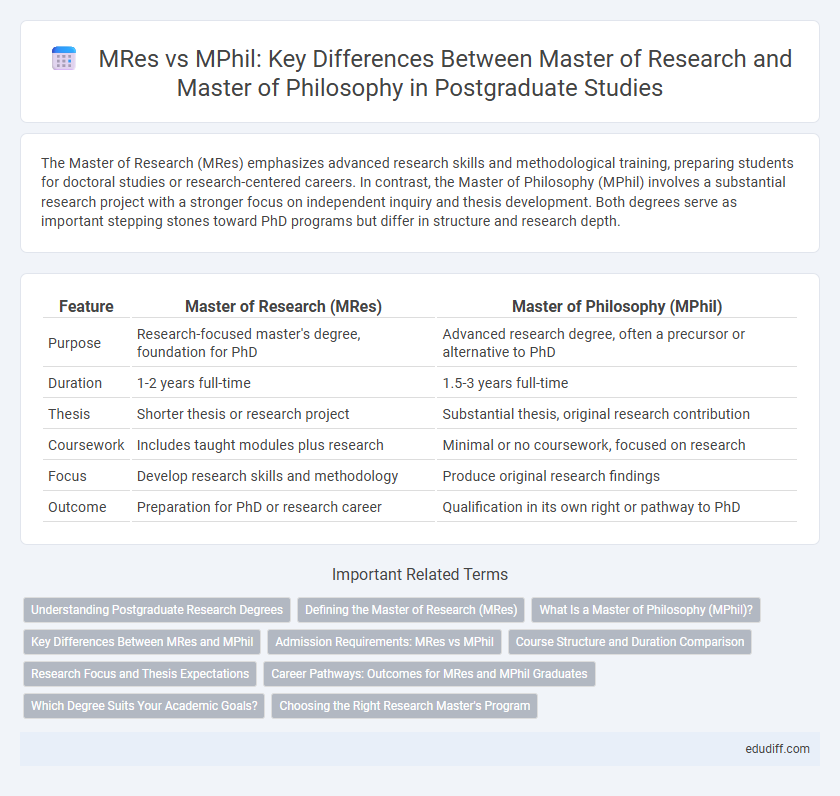The Master of Research (MRes) emphasizes advanced research skills and methodological training, preparing students for doctoral studies or research-centered careers. In contrast, the Master of Philosophy (MPhil) involves a substantial research project with a stronger focus on independent inquiry and thesis development. Both degrees serve as important stepping stones toward PhD programs but differ in structure and research depth.
Table of Comparison
| Feature | Master of Research (MRes) | Master of Philosophy (MPhil) |
|---|---|---|
| Purpose | Research-focused master's degree, foundation for PhD | Advanced research degree, often a precursor or alternative to PhD |
| Duration | 1-2 years full-time | 1.5-3 years full-time |
| Thesis | Shorter thesis or research project | Substantial thesis, original research contribution |
| Coursework | Includes taught modules plus research | Minimal or no coursework, focused on research |
| Focus | Develop research skills and methodology | Produce original research findings |
| Outcome | Preparation for PhD or research career | Qualification in its own right or pathway to PhD |
Understanding Postgraduate Research Degrees
Master of Research (MRes) programs emphasize advanced research training and methodological skills, typically serving as a precursor to doctoral studies. Master of Philosophy (MPhil) degrees involve substantial original research and can act as standalone qualifications or stepping stones to a PhD. Both degrees are integral in postgraduate research pathways, with MRes focused on research preparation and MPhil on the execution of independent research projects.
Defining the Master of Research (MRes)
The Master of Research (MRes) is a postgraduate degree emphasizing advanced research training and methodology across various disciplines. It provides specialized preparation for doctoral studies or research-intensive careers by combining taught components with a substantial research project. Compared to the Master of Philosophy (MPhil), the MRes typically focuses more on developing practical research skills and techniques, making it an essential qualification for aspiring researchers.
What Is a Master of Philosophy (MPhil)?
A Master of Philosophy (MPhil) is a postgraduate research degree that emphasizes independent, original research leading to a substantial thesis. It serves as a critical stepping stone for doctoral studies, offering in-depth training in research methodologies within a specific discipline. The MPhil typically involves less taught coursework than an MRes and focuses more on producing publishable research outcomes.
Key Differences Between MRes and MPhil
The Master of Research (MRes) primarily emphasizes structured research training and coursework alongside a smaller thesis, designed to equip students with advanced research skills for academic or professional careers. In contrast, the Master of Philosophy (MPhil) involves a more extensive original research project culminating in a substantial thesis, often serving as a precursor to PhD studies. MRes degrees are ideal for those seeking foundational research experience, while MPhil programs demand higher independent research commitment and contribute significantly to academic scholarship.
Admission Requirements: MRes vs MPhil
Admission requirements for a Master of Research (MRes) typically include a lower academic threshold, often requiring a bachelor's degree with a minimum second-class honors or equivalent. In contrast, Master of Philosophy (MPhil) admissions usually demand a higher academic standing, such as a first-class honors degree or equivalent research experience, reflecting its focus on independent research preparation. Both programs commonly require a research proposal and letters of recommendation, but the MPhil often has more stringent criteria due to its role as a precursor to doctoral studies.
Course Structure and Duration Comparison
The Master of Research (MRes) typically emphasizes a structured approach with taught modules alongside a substantial research project, usually completed within one to two years. In contrast, the Master of Philosophy (MPhil) is predominantly research-focused, featuring minimal coursework and extending from one to three years depending on the institution and research scope. Both degrees serve as pathways to doctoral study, but the MRes offers a more guided curriculum while the MPhil centers on independent research development.
Research Focus and Thesis Expectations
The Master of Research (MRes) emphasizes rigorous training in research methods with a shorter thesis typically ranging from 20,000 to 40,000 words, designed to prepare students for doctoral study or research-intensive roles. In contrast, the Master of Philosophy (MPhil) requires a more substantial original research project culminating in a thesis of 40,000 to 60,000 words, often serving as a bridge between taught master's degrees and PhD programs. Both degrees demand strong analytical skills and a commitment to advancing knowledge within a specific discipline, with the MPhil showcasing greater depth and scope in research contribution.
Career Pathways: Outcomes for MRes and MPhil Graduates
MRes graduates typically pursue careers in research-intensive roles, doctoral programs, or specialized industry positions that require advanced methodological expertise. MPhil holders often advance to doctoral studies or academic appointments, benefiting from a thesis-based curriculum that emphasizes independent research skills and critical analysis. Employers in academia, research institutions, and knowledge-driven sectors highly value the practical research experience and theoretical grounding provided by both MRes and MPhil qualifications.
Which Degree Suits Your Academic Goals?
The Master of Research (MRes) is designed for students seeking intensive research training with a structured curriculum, ideal for those aiming to progress directly to a PhD or a research-focused career. The Master of Philosophy (MPhil) offers a more flexible, thesis-driven approach, suitable for candidates desiring a deeper independent research experience without committing to a full doctoral program. Choosing between MRes and MPhil depends on your academic goals: prioritize an MRes for a foundation in research methodologies and an MPhil for an opportunity to develop specific expertise through extended investigation.
Choosing the Right Research Master's Program
Choosing between a Master of Research (MRes) and a Master of Philosophy (MPhil) depends on your academic goals and research aspirations. An MRes emphasizes intensive research training and methodology preparation, ideal for students aiming to pursue a PhD or research-focused careers. The MPhil offers a more substantial, independent research project with a thesis, suitable for those seeking deeper specialization without committing immediately to doctoral study.
Master of Research (MRes) vs Master of Philosophy (MPhil) Infographic

 edudiff.com
edudiff.com